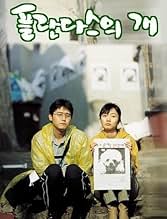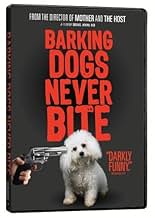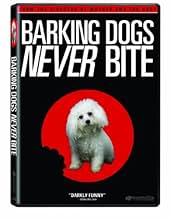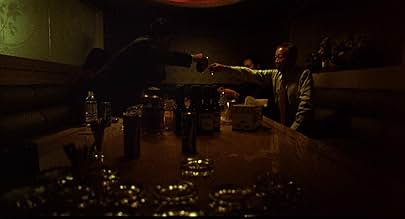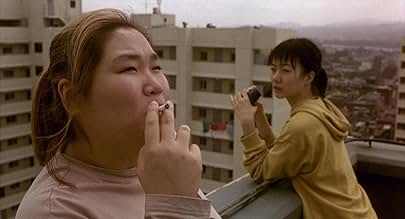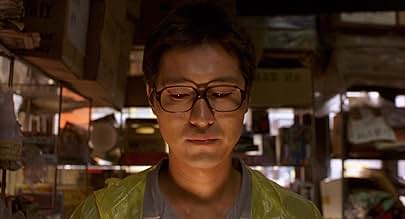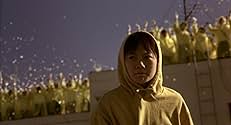IMDb RATING
6.9/10
12K
YOUR RATING
An idle part-time college lecturer is annoyed by the yapping sound of a nearby dog. He decides to take drastic action.An idle part-time college lecturer is annoyed by the yapping sound of a nearby dog. He decides to take drastic action.An idle part-time college lecturer is annoyed by the yapping sound of a nearby dog. He decides to take drastic action.
- Director
- Writers
- Stars
- Awards
- 4 wins & 4 nominations total
Kim Ho-jung
- Eun-sil
- (as Ho-jung Kim)
Byun Hee-Bong
- Janitor
- (as Hie-bong Byeon)
Jin-gu Kim
- Granny
- (as Gin-goo Kim)
- Director
- Writers
- All cast & crew
- Production, box office & more at IMDbPro
Featured reviews
I only found about this movie through the director Bong Jun Ho, who I think is a legend for producing Salineui Chuak. Anyways my hopes were high for this movie.
This was the debut film for the director Bong and the camera-work and music scores are kind of crude for a recent Korean film. That's not a bad thing since it brings more vibrancy and tension of the situation, especially in the chase scenes.
Some people might find themselves disturbed by the scenes with the dogs, but there isn't much in it, just the fact that they're not treated like your ordinary pet. Try to put yourself into a Korean's point of view where a dog isn't any different from chicken.
The comedy element cannot be missed out too. The situations are so hilarious and fresh, it felt as if my new eye opened. What's amazing is that these situations look realistic and it's believable.
Some marks were deducted because even though the scenes were original and executed well, the director failed to put them all together to have some sort of meaning. It's really weird how my favourite scenes are the ones that could've been cut (like the toilet paper scene and the ghost story in the basement)
This was the debut film for the director Bong and the camera-work and music scores are kind of crude for a recent Korean film. That's not a bad thing since it brings more vibrancy and tension of the situation, especially in the chase scenes.
Some people might find themselves disturbed by the scenes with the dogs, but there isn't much in it, just the fact that they're not treated like your ordinary pet. Try to put yourself into a Korean's point of view where a dog isn't any different from chicken.
The comedy element cannot be missed out too. The situations are so hilarious and fresh, it felt as if my new eye opened. What's amazing is that these situations look realistic and it's believable.
Some marks were deducted because even though the scenes were original and executed well, the director failed to put them all together to have some sort of meaning. It's really weird how my favourite scenes are the ones that could've been cut (like the toilet paper scene and the ghost story in the basement)
Barking Dogs Never Bite is written & directed by Bong Joon-ho and stars Sung-jae Lee, Doona Bae, Hie-bong Byeon, Su-hee Go and Ho-jung Kim.
An idle part-time college lector is annoyed by the yapping sound of a near-by dog. He decides to take drastic action.
Bong Joon-ho is a critically-acclaimed, visionary director who has created some of cinema's finest moments; be it cinematography, editing or storytelling, he has made a name for himself and is most definitely one to look out for. But, what kickstarted this successful career? A little film called Puhran Dah Suh Uigeh, translated as Barking Dogs Never Bite. The question is, how good is it?
The answer; very good. Even though the story seems unadorned, this is an incredibly intricate experience, featuring compelling visuals, brilliant performances, smart editing and the foundation of Joon-ho's unique staging technique. He allows actors to perform with their body, eyes and hands, as a way of attracting the viewers attention, further propelling the story forward. This can be seen in the scene where the Janitor (Hie-Bong Byeon) is telling the tale of Boiler Kim in the apartment complex basement. Ensemble staging becomes a great part of Joon-ho's films, especially in Memories of Murder, but this is where it started. The performances from Sung-jae Lee and Doona Bae are satisfyingly entertaining, and although never branching out to anything more dynamic, they both complement each other well and keep the film running trippingly.
Original music by Sung-woo Jo is strangely fitting and enjoyable, being a well- developed framework that sounds simplistic yet never venturing too far as to distract the viewer.
I've said it before and I'll say it again, editing is a huge part of any film, and so should be treated with absolute care. I imagine Joon-ho had a watchful eye over Eun Soo Lee in the editing process. There are moments where it's sharp and fast-paced and others slow and steady, it all depends on the pace and rhythm of the scene. It's also hard to place the genre of this film, it's sold as a dark comedy, but here and there are drops of horror/thriller themes, which really adds to the originality of this film and aids its director.
It was incredibly difficult to come by a copy of this film with English subtitles attached, so I only hope the version I watched was accurate and true to the original dialogue. However, I feel the experience would stay very much the same without any understanding of the spoken language. It's all told through visuals and body-language which is likely why Bong Joon-ho's work is so widely respected by most audiences.
Verdict; I truly believe that anyone studying film, or looking to work in the industry, should take a look at the work of Joon-ho, if only to gain more of an understanding of how stories can be told not just through words, but through movement and emotion. While Barking Dogs Never Bite is a simple concept, it's captured beautifully through visuals.
Puhran Dah Suh Uigeh (Barking Dogs Never Bite), 8/10.
An idle part-time college lector is annoyed by the yapping sound of a near-by dog. He decides to take drastic action.
Bong Joon-ho is a critically-acclaimed, visionary director who has created some of cinema's finest moments; be it cinematography, editing or storytelling, he has made a name for himself and is most definitely one to look out for. But, what kickstarted this successful career? A little film called Puhran Dah Suh Uigeh, translated as Barking Dogs Never Bite. The question is, how good is it?
The answer; very good. Even though the story seems unadorned, this is an incredibly intricate experience, featuring compelling visuals, brilliant performances, smart editing and the foundation of Joon-ho's unique staging technique. He allows actors to perform with their body, eyes and hands, as a way of attracting the viewers attention, further propelling the story forward. This can be seen in the scene where the Janitor (Hie-Bong Byeon) is telling the tale of Boiler Kim in the apartment complex basement. Ensemble staging becomes a great part of Joon-ho's films, especially in Memories of Murder, but this is where it started. The performances from Sung-jae Lee and Doona Bae are satisfyingly entertaining, and although never branching out to anything more dynamic, they both complement each other well and keep the film running trippingly.
Original music by Sung-woo Jo is strangely fitting and enjoyable, being a well- developed framework that sounds simplistic yet never venturing too far as to distract the viewer.
I've said it before and I'll say it again, editing is a huge part of any film, and so should be treated with absolute care. I imagine Joon-ho had a watchful eye over Eun Soo Lee in the editing process. There are moments where it's sharp and fast-paced and others slow and steady, it all depends on the pace and rhythm of the scene. It's also hard to place the genre of this film, it's sold as a dark comedy, but here and there are drops of horror/thriller themes, which really adds to the originality of this film and aids its director.
It was incredibly difficult to come by a copy of this film with English subtitles attached, so I only hope the version I watched was accurate and true to the original dialogue. However, I feel the experience would stay very much the same without any understanding of the spoken language. It's all told through visuals and body-language which is likely why Bong Joon-ho's work is so widely respected by most audiences.
Verdict; I truly believe that anyone studying film, or looking to work in the industry, should take a look at the work of Joon-ho, if only to gain more of an understanding of how stories can be told not just through words, but through movement and emotion. While Barking Dogs Never Bite is a simple concept, it's captured beautifully through visuals.
Puhran Dah Suh Uigeh (Barking Dogs Never Bite), 8/10.
10theorbys
This is something of a rarity, a indie Korean film. It's also Joon-ho Bong's directorial debut. It's brilliant. Slow, but impeccably paced and broadly intermixed with multiple levels of wonderful comedy, acting, atmosphere (a kind of existential (and cement) wasteland), and directing. Be warned. Pet lovers are going to be shocked, and maybe outraged. But really, don't take this too literally, Joon-ho Bong knows he is playing with your sensibilities and he knows that you know it (or you should know it by now, if you have been watching film, tv, and advertising for your entire life). This is real cinematic virtuosity.
The promotion for this film compared it to American Beauty and that was a somewhat surprising but very apt comparison. American Beauty would be a fine double bill with this. But, if you have not seen any other Korean films you should give some a try. I saw this as part of a festival with JSA (Joint Security Area), The Isle and some others, but those two were very good and would also be good for a double bill. A little farther afield might be Tsai Ming Liang's the HOLE, or even farther, (and certainly not for the fainthearted) Go Go Second Time Virgin by Kosi Wakamatsu. Both intense looks at life in barren modern times and barren apartment complexes.
The promotion for this film compared it to American Beauty and that was a somewhat surprising but very apt comparison. American Beauty would be a fine double bill with this. But, if you have not seen any other Korean films you should give some a try. I saw this as part of a festival with JSA (Joint Security Area), The Isle and some others, but those two were very good and would also be good for a double bill. A little farther afield might be Tsai Ming Liang's the HOLE, or even farther, (and certainly not for the fainthearted) Go Go Second Time Virgin by Kosi Wakamatsu. Both intense looks at life in barren modern times and barren apartment complexes.
Bong Joon Ho's first feature is a pseudo satirical black comedy centred on a sad lecturer who decides to take drastic action on a barking dog that's mildly annoying him as he wallows in his own self pity. Needless to say, 'Barking Dogs Never Bite (2000)' is unconcerned with giving us sympathetic characters to root for. Instead, it presents everyone amorally, regardless of their actions. This isn't a bad thing, but it means that you have to be willing to accept - and, in some ways, see past - each major character's flaws in order to remain invested in their journeys. For me, that isn't an issue. I can see how it would hamper some people's enjoyment of the piece, though, especially if they're expecting something more traditional. Another thing that will likely put people off is the movie's unflinching depictions of animal abuse; basically, dog lovers beware. The thing never feels especially cruel but it's certainly rather shocking when it comes to its treatment of its canine characters. It's perhaps important to state, as the flick does in its opening titles, that no animals were harmed during the production. Still, there's a known rule that when a character kills a dog, the audience will start to hate them; that's why such an act is usually reserved for villains (and not often seen, either). This picture asks you to root for a protagonist who has partaken in such behaviour. That's going to be a major put-off for a lot of people. However, having said all that, I ultimately like the movie quite a bit. It's an unconventional and unpredictable mix of genres with several surprisingly exciting set-pieces. It's engaging all the way through, although it does slow down considerably for its extended denouement. It's often quite funny in its own sort of way, too. It's a rock-solid start for a director who consistently presents genre-bending, audience-challenging fare. 7/10
Reviewed @Filmmining101
Lovers of the Bong Joon-ho's (now) distinct style will find plenty to love in his directional debut, "Barking Dogs Never Bite" (2000). While the beloved South Korean filmmaker has indulged us into more socially conscious stories supported by sharp commentary around the working and human ethics which bound the film's world, "Barking Dogs Never Bite" is the first step towards an evolutionary scale of artistry that will attract moviegoers around the world for years to come.
Starting his career with a less ambitious (for the lack of a better term) story, the movie features all his known trademarks you would have come to expect (e.g., imposing architecture, isolated main characters, layered storytelling). Dressed heartily with black humor, this comedy centered around missing dogs in a massive apartment complex has reflective undertones about a society that neglects its citizens (before they do it themselves first). Dogs, used as a symbol of status, currency and supply even between the lower socio-economic individuals seem to be having a better life than their owners live in a poetic sense of irony.
Struggling to make means end and lacking a job, our "hero", a dubious and passive academic is in an abusive relationship with his pregnant wife, hates dogs and has no money to buy out his promotion to professor. This protagonist becomes the key player in a tale of theft, misunderstandings and social allegory which the West rarely offers. Typically in a Joon-ho flick, several elements are usually metaphors for the cast's state of mind and the story's progression: cigarettes breaks and dogs represent freedom in a world that relies on self catered interactions to move forward. Bae Donna's character is also stuck in a thankless position of building management conjuring an interesting dynamic with Sung-Jae Lee's pair-less academic and complementing the same coin from a different side.
A master at blending genres with extreme efficiency, Joon-ho manages to generate suspense from the simplest of circumstances; an account of Boiler Kim's (who represents the working and honorable class of South Korea) tragedy feels like something that John Carpenter would direct, echoing similar sentiments in Joon-ho's own Oscar winning "Parasite" (2019) nineteen years later. When the final resolution comes in the complex parable of human relationships, Bong-ho's script keeps the audience guessing on whether this will end in tears or laughs simultaneously making it clear where he and his actors stand. Occasionally it does feel smaller in scale and less engulfing in its thematic presentation than the rest of his iconic filmography with with frequent tonal shifts and a not so likeable main character, especially for those who like dogs. But it is the birth of one of the most important voices in cinema which three years later will give us the masterpiece that "Memories of Murder" is (2003).
Lovers of the Bong Joon-ho's (now) distinct style will find plenty to love in his directional debut, "Barking Dogs Never Bite" (2000). While the beloved South Korean filmmaker has indulged us into more socially conscious stories supported by sharp commentary around the working and human ethics which bound the film's world, "Barking Dogs Never Bite" is the first step towards an evolutionary scale of artistry that will attract moviegoers around the world for years to come.
Starting his career with a less ambitious (for the lack of a better term) story, the movie features all his known trademarks you would have come to expect (e.g., imposing architecture, isolated main characters, layered storytelling). Dressed heartily with black humor, this comedy centered around missing dogs in a massive apartment complex has reflective undertones about a society that neglects its citizens (before they do it themselves first). Dogs, used as a symbol of status, currency and supply even between the lower socio-economic individuals seem to be having a better life than their owners live in a poetic sense of irony.
Struggling to make means end and lacking a job, our "hero", a dubious and passive academic is in an abusive relationship with his pregnant wife, hates dogs and has no money to buy out his promotion to professor. This protagonist becomes the key player in a tale of theft, misunderstandings and social allegory which the West rarely offers. Typically in a Joon-ho flick, several elements are usually metaphors for the cast's state of mind and the story's progression: cigarettes breaks and dogs represent freedom in a world that relies on self catered interactions to move forward. Bae Donna's character is also stuck in a thankless position of building management conjuring an interesting dynamic with Sung-Jae Lee's pair-less academic and complementing the same coin from a different side.
A master at blending genres with extreme efficiency, Joon-ho manages to generate suspense from the simplest of circumstances; an account of Boiler Kim's (who represents the working and honorable class of South Korea) tragedy feels like something that John Carpenter would direct, echoing similar sentiments in Joon-ho's own Oscar winning "Parasite" (2019) nineteen years later. When the final resolution comes in the complex parable of human relationships, Bong-ho's script keeps the audience guessing on whether this will end in tears or laughs simultaneously making it clear where he and his actors stand. Occasionally it does feel smaller in scale and less engulfing in its thematic presentation than the rest of his iconic filmography with with frequent tonal shifts and a not so likeable main character, especially for those who like dogs. But it is the birth of one of the most important voices in cinema which three years later will give us the masterpiece that "Memories of Murder" is (2003).
Did you know
- TriviaMade for around 950 million won (around $800,000/£500,000), Bong Joon Ho was hoping the film would break-even at the box-office, however only around 100,000 viewers nationwide in South Korea saw the film, concluding Bong to note that; "It was a total flop at the box office."
- ConnectionsFeatures Christmas in August (1998)
- SoundtracksBarking Dogs Never Bite
Composed and performed by Cherry Filter
- How long is Barking Dogs Never Bite?Powered by Alexa
Details
Box office
- Gross worldwide
- $45,853
- Runtime
- 1h 50m(110 min)
- Color
- Sound mix
- Aspect ratio
- 1.85 : 1
Contribute to this page
Suggest an edit or add missing content



